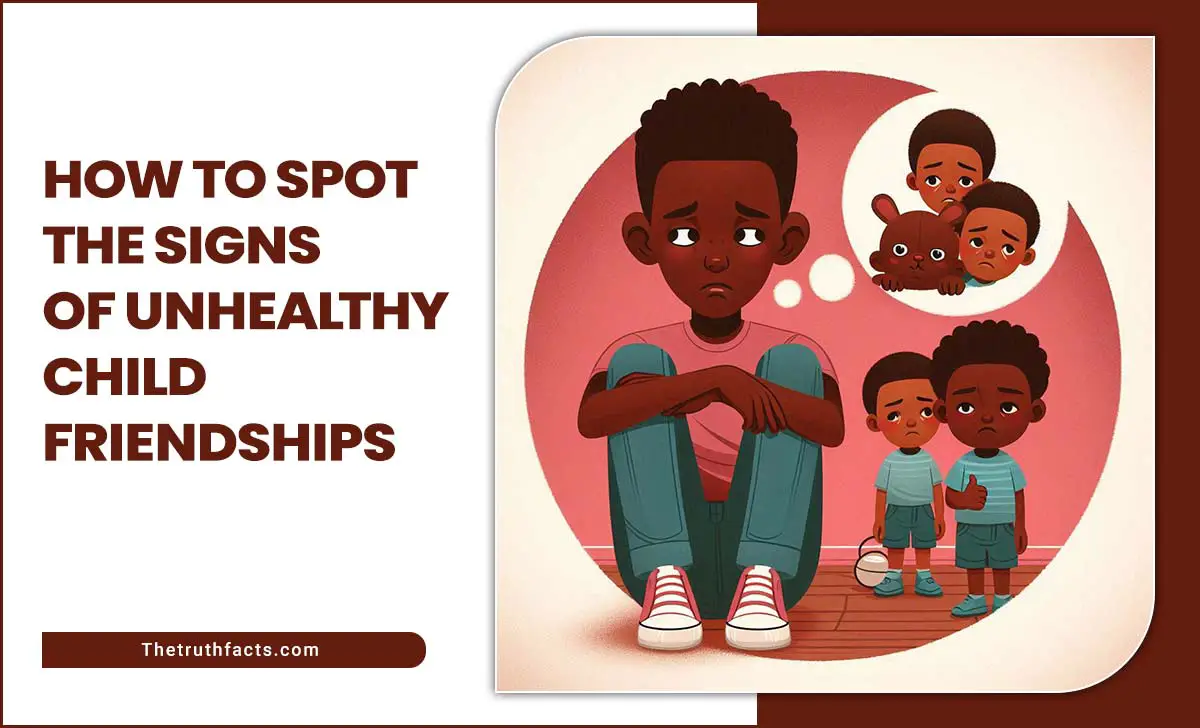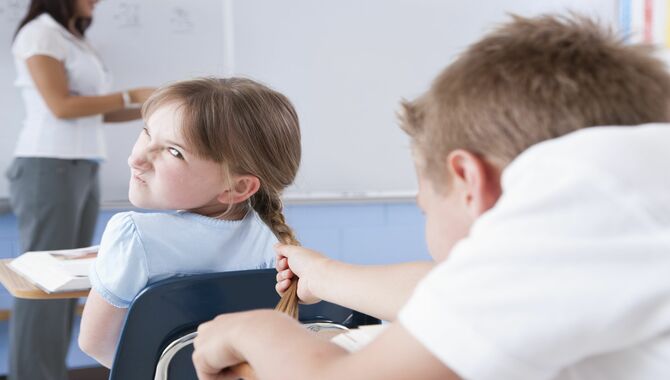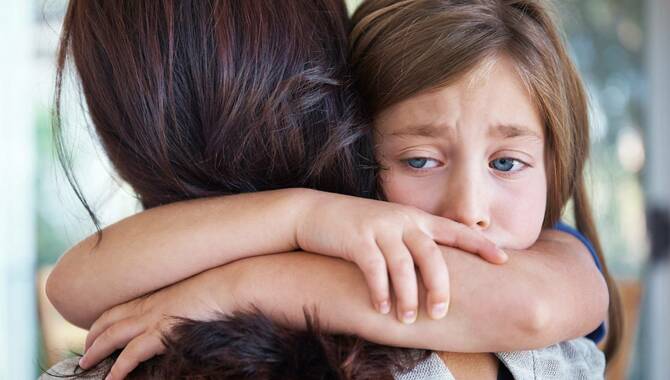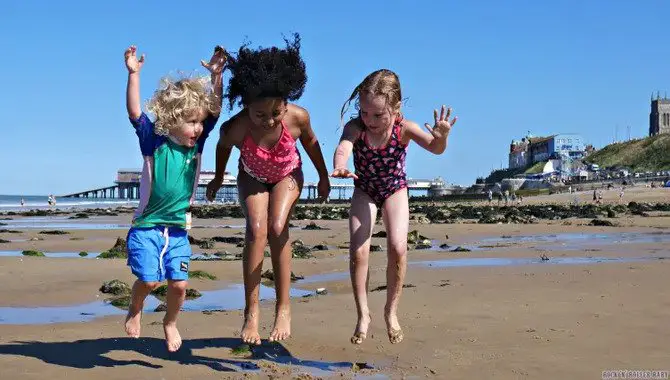As parents, it’s important to be mindful of our children’s friends. Not only do we want our kids to develop healthy social relationships, but we also want to be able to spot the signs of an unhealthy friendship.
In this blog post, how to spot the signs of unhealthy child friendships and how to deal with each type of friendship. We also have some helpful tips for preventing your child from forming unhealthy friendships. So stay tuned and learn everything you need to know about spotting and preventing unhealthy child friendships.

8 Step Signs Of An Unhealthy Friendship

Child friendships are a crucial part of child development. However, if they’re not healthy, they can negatively affect the child and the peer group. Look for signs of neglect or emotional abuse in your child’s friendships. If you see any red flags, take steps to terminate the friendship immediately.
Monitor your child’s social media and online activities closely – these are often a window into their true character. Be on the lookout for unhealthy dynamics in your child’s peer group and address them promptly. This way, you can help safeguard them from potential harm and help them develop healthy social relationships.
1. There Is A Power Imbalance
There is a power imbalance in friendships between children and adults. This is often due to one child taking charge and making all the decisions without any communication or input from the other party. This can be unhealthy for both parties involved as it results in less freedom and expression on the child, who might feel like they have no voice.
On top of that, if this type of friendship becomes too controlling or manipulative, it could indicate an issue. In such cases, it would be best to get help from a professional who can assess what’s going on and provide guidance accordingly.
2. Features Unkind Or Mean Behavior

It is important to teach children the importance of being kind and supportive toward their friends. If they are cruel in their friendship, it’s likely that they will be cruel adults too. Take note of any signs that the friendship might be unhealthy, such as excluding someone or engaging in name-calling. Speak to your child about why they might behave this way and see if there is anything you can do to resolve the issue.
3. Involves Drama
If you notice any of the following signs, it might be time to consider whether or not your child’s new friendship is healthy. These could indicate that there is a potential problem with the relationship and that intervention may be necessary.
4. Contains Jealousy And Competitiveness
Children often develop unhealthy friendships when they feel left out or unsupported. As a result, they may become competitive and jealous of each other’s friendship status.
This can have long-term negative impacts on their development and social skills. It is important to intervene early and create a support system for the child. Usually, once the friendship is unhealthy, it is hard to fix and can have lasting effects on the child’s emotional well-being.
5. Involves Social Exclusion Or Isolation
Teenagers who are involved in unhealthy friendships often experience social exclusion or isolation. These relationships can be negative and unstable, leading to school drop-out, lack of friends, and health problems. If you notice any of these signs in your child, it’s time to take action and protect their wellbeing.
6. Includes Controlling Behaviors
There is no question that healthy social relationships are vital for children. However, if a child has unhealthy friendships, he or she may display controlling behaviors. This can include the tendency to be demanding, jealous, and aggressive.
In turn, this can negatively affect the child’s mental and physical health. It is important to speak to a professional if you are worried about how your child is spending his or her time – there could be indications of an unhealthy friendship relationship.
7. Involves Rule Breaking
They may seem like perfectly normal friends to you, but there could be underlying problems that are causing damage. Children who are involved in unhealthy friendships often break social norms and rules. This can involve them behaving in a way that is verbal, emotional, or physically abusive towards their friend.
In some cases, they may even develop mental health problems as a result of this toxic relationship. If you think your child’s friendship might harm them, it is important to talk about it with them to get help resolving the issue before it gets worse.
8. Gives You A Bad Vibe
When you start to notice signs of emotional and physical abuse in your child’s friendship, it is time to take action. Abuse can have a negative impact on both the abuser and the abused, leaving them feeling isolated and unsupported. It might be difficult to break free from this toxic relationship, but with patience and support, it is possible.
Why Friendships Are Important

Childhood friendships are important for a variety of reasons. They provide positive reinforcement, social opportunities, and emotional support. When friendships begin to deteriorate, it can lead to a number of problems, such as bullying or violence.
It’s important to be aware of the signs that your child is having an unhealthy friendship and take action accordingly. For example, monitor how often your child spends time with their friends and look for any changes in behavior. If you think something is wrong, speak with your child about it. Finally, be sure to encourage healthy friendships and provide positive reinforcement for healthy social interactions.
Characteristics Of A Healthy Friendship

Friendships are important for our psychological health and well-being. Regular social activities make us happy and help us develop social skills, build self-esteem, and cope with stress. Regarding our child’s friendships, some of the key characteristics of a healthy relationship include trust, supportiveness, and empathy.
If you notice any of these signs being absent in your child’s friendship circle or if you feel like something is off about them, it may be time to intervene. Talking to your child about their friends can help identify any potential problems early on so that can correct them before things get too far out of hand.
How To Deal With Each Type Of Unhealthy Child Friendship?

Poor communication is a hallmark of these types of friendships, leading to misery for all involved. Children who abuse drugs or alcohol often find friends in trouble, too, so be on the lookout for this behavior.
Kids who have physical fights or who talk about suicide are typically drawn to other kids like that too. If you see any of these signs in your child’s friendship, take steps to address the issue. It may not be easy, but it’s important to protect your child from being hurt.
Tips For Preventing Your Child From Forming Unhealthy Friendships

Watching your child form close friendships can be tough, but it’s important to be observant of the signs of friendship stress. Here are a few tips to help you prevent your child from forming unhealthy friendships: Always be observant of your child’s social interactions and look for signs of friendship stress.
Don’t allow your child to be a part-time member of any friendships. it will only create problems down the road. Teach them how important it is to establish good communication with friends before they join in on anything too serious or intense. Offer support and set boundaries when needed, but always let your child feel safe and loved during these difficult times.
Conclusion
The importance of friendships cannot be overstated. In fact, research has shown that strong social relationships can have a positive impact on mental health and well-being. However, child friendships can also be a source of toxicity for children.
If you are concerned about the health of your child’s friendship circle, here are some tips on how to deal with each type of unhealthy friendship. Be open and honest with your child about the dangers of friendship toxicity and help them develop healthy social relationships in the future. Thanks for reading!
Frequently Asked Questions
How Do I Deal With My Child’s Friend Who Is Not Good For Them?
1.Suppose you notice any of the following signs. In that case, it is time to take action and protect your child:
2.Your child constantly misses school or comes home late due to spending time with this friend
3.This friend influences your child to break social norms and do things they would not normally do
4.You feel like this friend is always borrowing money or taking advantage of your child.
What Should I Do If My Child Feels Unsafe Around Their Friend?
When it comes to Safe Social Engagement, one of the most important things you can do is monitor your child’s friendships carefully. This means paying attention to what kind of conversations they are having, who they are hanging out with, and how active their social media presence is. If you notice any changes in your child’s behavior or mood around their friends, it may be time to take action.
Why Do Children Have Unhealthy Friendships?
Children with unhealthy friendships are likelier to feel lonely, anxious, depressed, and isolated. In fact, these negative effects can linger into adulthood for some individuals. As a result of this, children with unhealthy friendships may struggle in areas like mental and physical health. Parental awareness is key when it comes to identifying if a child is involved in an unhealthy friendship.
How Can I Make Sure My Child Has A Healthy Child Friendship?
It’s important to monitor your child’s friendships closely, as unhealthy ones can lead to developmental issues. For example, if you notice that your child is spending a lot of time with the same person and they’re not spending time with other friends, then this might be a sign that their friendship is unhealthy.
How Can I Know If My Child Is Being Bullied By His/Her Friend?
The best way to know if your child is being bullied by his/her friend is to observe the situation and look for any behavioral changes. If your child becomes withdrawn, doesn’t want to go outside, or starts talking about death or suicide, it’s time to take action. You can also ask your child about what happened and see if he/she can provide a clear description of the incident.

I’m a writer and blogger who loves to talk about entertainment, culture, and relationships. I love to share my thoughts and insights on these topics, and I’m always looking for new ways to engage with my readers. I’m also a big fan of learning new things, so I’m always exploring new areas of interest.
